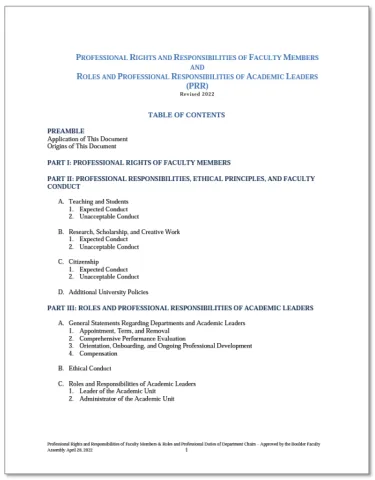Faculty Relations
The position of Director of Faculty Relations was established in 2007 in recognition of the need to provide services to faculty members and academic administrators to help develop and maintain working relationships that are positive and productive. These services include individual consultation, mediation, assessment of unit dynamics, and guidance on allegations of unprofessional behavior as defined in the Professional Rights and Responsibilities (PRR).
Guiding Principles
- Conflicts should be addressed and resolved at the lowest level as quickly and with the least formality possible.
- Faculty Relations exercises independent judgment.
- Contacts and communications between clients and the Director of Faculty Relations are confidential except in cases requiring formal investigation and fact-finding or as otherwise required by law or university regulations.
Service Eligibility
- Faculty members, including research faculty.
- Academic administrators holding a faculty appointment.
- Post-doctoral appointees who have a conflict issue with a faculty member.
Consulting Services
Faculty Relations offers individualized, confidential consultations free of charge to faculty, including research faculty and postdocs, on the CU Boulder campus. We can consult on specific aspects of your work, including how to manage professional relationships and conflict resolution. We can also quickly connect you to appropriate campus support and resources when needed.
- Individual Consultation: Being a sounding board for your professional relationships and helping you identify multiple ways to respond to difficult situations.
- Alternative Dispute Resolution: Offering mediation--a confidential, voluntary decision-making process--to help participants resolve or best manage their disputes with one another by helping parties reach agreements about what each will do differently in the future.
- Restorative Justice Conferences: Applying restorative justice principles for addressing and repairing harm for those harmed and taking accountability and responsibility by those who harmed.
- Circle Processes: Creating opportunities for a facilitated dialogue through which participants share and reflect upon their experiences related to a topic or context in a way that avoids misunderstandings and assumptions that may arise in unstructured conversation.
- Professional Rights and Responsibilities (PRR): Providing information regarding the policy, standards of professionalism, and related procedures. Guiding investigations and making recommendations for the disposition of allegations of unprofessional behavior.
Professional Rights and Responsibilities (PRR)

Introduction
The foundation for the Professional Rights and Responsibilities of Faculty Members and Roles and Professional Responsibilities of Academic Leaders was first developed by the faculty at CU Boulder in the early 1980s. The PRR describes the professional standards faculty members are expected to maintain and provides a mechanism for addressing allegations that a faculty member has failed to meet those standards.
PRR Documents & Links
- The Academic Affairs policy on the PRR gives force and effect to the provisions of the PRR as approved by the Boulder Faculty Assembly (BFA) on March 4, 2010, and as amended subsequently.
- The PRR comprises the procedures of this policy and applies to anyone classified as faculty, including tenured, tenure-track, instructional, research, and clinical faculty. Please see the preamble for more details on the application of the document, plus types of official and working titles.
- There is Skillsoft Percipio training for the PRR available. All academic leaders are mandated by the provost to complete this, and all are welcome to learn more about faculty rights and privileges and concomitant professional expectations and responsibilities.
- Additional information on the PRR can be found on the BFA Resources webpage.
Faculty and academic leaders, including research faculty and postdoctoral fellows, who want guidance on understanding the PRR are welcome to contact Faculty Relations for a consultation.
Frequently Asked Questions (FAQs)
Informal advice, coaching, and mediation are provided confidentially. Unless you grant permission, the Director of Faculty Relations will not reveal your name or information about your situation to others. Note: Confidentiality cannot be assured in situations involving imminent physical danger or violation of law. By university policy, the director of faculty relations is obligated to report allegations of sexual harassment or discrimination.
Yes, you may bring a concern to Faculty Relations instead of, or prior to, employing other existing University procedures.
No. Faculty Relations makes recommendations to the appropriate appointing authority. Only the appointing authority may impose sanctions.
In addition to offering formal training for chairs, Faculty Relations can provide one-on-one coaching for any question that arises in the course of your work as chair. A confidential sounding board for you is always just a phone call away.
Services of the faculty ombuds are always strictly voluntary, confidential, and informal. The Director of Faculty Relations may also advise, make recommendations for actions; and engage in more formal mediation processes (including mediation mandated by an academic administrator).
Yes. If you want to address the problem yourself, Faculty Relations can provide advice and coaching on how to proceed. Alternatively, Faculty Relations can engage the parties directly on your behalf.
Other Campus Resources for Faculty
Compliance, Community, & Teaching Resources
Office of Institutional Equity and Compliance (OIEC)
303-492-2127
Ombuds Office
303-492-5077
Center for Inclusion & Social Change
303-492-0272
Safety, Wellness, & Accommodations Resources
Disability Services
303-492-8671
Americans with Disability Act (ADA) & Accessibility Assistance
303-492-9725
Office of Victim Assistance
303-492-8855
Faculty and Staff Assistance Program
303-492-3020
Counseling and Psychiatric Services
303-492-2277 (24/7 support)
University of Colorado Police Department
303-492-6666 (For emergencies, dial 911)

